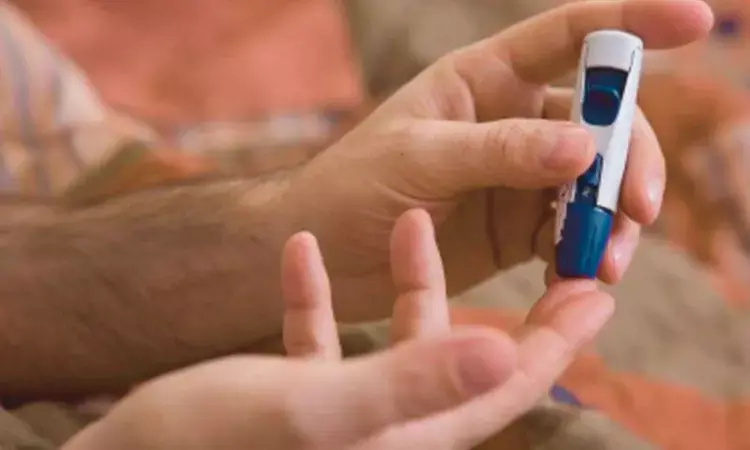- Home
- Medical news & Guidelines
- Anesthesiology
- Cardiology and CTVS
- Critical Care
- Dentistry
- Dermatology
- Diabetes and Endocrinology
- ENT
- Gastroenterology
- Medicine
- Nephrology
- Neurology
- Obstretics-Gynaecology
- Oncology
- Ophthalmology
- Orthopaedics
- Pediatrics-Neonatology
- Psychiatry
- Pulmonology
- Radiology
- Surgery
- Urology
- Laboratory Medicine
- Diet
- Nursing
- Paramedical
- Physiotherapy
- Health news
- Fact Check
- Bone Health Fact Check
- Brain Health Fact Check
- Cancer Related Fact Check
- Child Care Fact Check
- Dental and oral health fact check
- Diabetes and metabolic health fact check
- Diet and Nutrition Fact Check
- Eye and ENT Care Fact Check
- Fitness fact check
- Gut health fact check
- Heart health fact check
- Kidney health fact check
- Medical education fact check
- Men's health fact check
- Respiratory fact check
- Skin and hair care fact check
- Vaccine and Immunization fact check
- Women's health fact check
- AYUSH
- State News
- Andaman and Nicobar Islands
- Andhra Pradesh
- Arunachal Pradesh
- Assam
- Bihar
- Chandigarh
- Chattisgarh
- Dadra and Nagar Haveli
- Daman and Diu
- Delhi
- Goa
- Gujarat
- Haryana
- Himachal Pradesh
- Jammu & Kashmir
- Jharkhand
- Karnataka
- Kerala
- Ladakh
- Lakshadweep
- Madhya Pradesh
- Maharashtra
- Manipur
- Meghalaya
- Mizoram
- Nagaland
- Odisha
- Puducherry
- Punjab
- Rajasthan
- Sikkim
- Tamil Nadu
- Telangana
- Tripura
- Uttar Pradesh
- Uttrakhand
- West Bengal
- Medical Education
- Industry
Abnormal Blood Sugar and HPV Together Triple Cervical Cancer Risk, Finds New Study

China: A recent study published in Frontiers in Endocrinology has revealed that dysglycemia and human papillomavirus (HPV) infection act synergistically to increase the risk of cervical cancer, with the cell proliferation marker Ki-67 potentially mediating this link.
The research, conducted by Yulong Zhang and colleagues from the Department of Gynecology, Fujian Maternity and Child Health Hospital, Fujian Medical University, Fuzhou, China, investigated how abnormal blood glucose levels interact with HPV infection to influence cervical carcinogenesis. While both HPV infection and dysglycemia are known independent risk factors for cervical cancer, their combined impact and underlying mechanisms have remained unclear until now.
The study included women with abnormal cervical screening results who underwent colposcopy and conization at Fujian Maternity and Child Health Hospital’s Cervical Disease Center between June 2018 and June 2023. Using statistical and regression analyses, the researchers examined associations between HPV infection, hyperglycemia, and different stages of cervical lesions, including low-grade (LSIL) and high-grade squamous intraepithelial lesions (HSIL), as well as invasive cervical cancer. Interaction and mediation models were applied to determine the role of Ki-67 in these associations.
Among the 4,115 participants analyzed, 573 had hyperglycemia alone, 1,479 were HPV-positive, and 548 had both conditions. The study led to the following findings:
- Women with prediabetes had a 2.47-fold higher risk of developing cervical cancer, while those with diabetes had a 3.67-fold higher risk.
- Participants with both hyperglycemia and HPV infection showed over a threefold increased risk (OR: 3.12) compared with HPV-positive women with normal glucose levels.
- A strong synergistic interaction between dysglycemia and HPV infection was identified, with an attributable proportion (AP) of 0.69 and a synergy index (SI) of 3.27.
- The combined impact of dysglycemia and HPV was significantly greater than their individual effects.
- Ki-67 expression, a marker of cellular proliferation, mediated around 40% of the effect of hyperglycemia, 37% of the effect of HPV, and over 55% of their combined impact.
- Dysglycemia and HPV together exerted a significant indirect influence on Ki-67 levels (estimate: 0.08).
According to the authors, these results emphasize the importance of integrated screening and management strategies targeting both glucose abnormalities and HPV infection in women. They emphasized that the dual presence of dysglycemia and HPV markedly amplifies cervical cancer risk, likely through Ki-67–mediated pathways.
The study highlights the potential of Ki-67 as a biological mediator linking metabolic dysfunction and viral oncogenesis. The researchers suggest that future investigations should focus on clarifying the molecular mechanisms involved and exploring therapeutic strategies aimed at modulating Ki-67–related pathways. Such approaches could help reduce cervical cancer risk in women affected by both HPV infection and metabolic disorders like prediabetes and diabetes.
Reference:
Zhang, Y., Zhang, J., Li, H., Zhuang, Y., You, Q., Su, Y., Zheng, X., & Li, S. (2025). Synergistic impact of dysglycemia and HPV on cervical cancer risk: A potential mediating role of Ki-67. Frontiers in Endocrinology, 16, 1422881. https://doi.org/10.3389/fendo.2025.1422881
Dr Kamal Kant Kohli-MBBS, DTCD- a chest specialist with more than 30 years of practice and a flair for writing clinical articles, Dr Kamal Kant Kohli joined Medical Dialogues as a Chief Editor of Medical News. Besides writing articles, as an editor, he proofreads and verifies all the medical content published on Medical Dialogues including those coming from journals, studies,medical conferences,guidelines etc. Email: drkohli@medicaldialogues.in. Contact no. 011-43720751
Next Story


